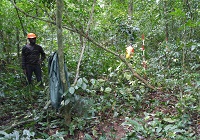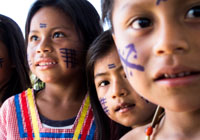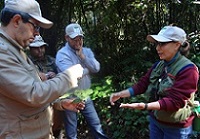What is REDD+?
Reducing Emissions from Deforestation and forest Degradation, plus the sustainable management of forests, and the conservation and enhancement of forest carbon stocks (REDD+), is an essential part of the global efforts to mitigate climate change. FAO supports developing countries in their REDD+ processes and in turning their political commitments, as represented in their Nationally Determined Contributions, into action on the ground.
At the core of this work are forests and the fundamental role they play in climate change mitigation, by removing CO2 from the atmosphere and storing it in biomass and soils. This also means that when forests are cleared or degraded, they can become a source of greenhouse gas (GHG) emissions by releasing that stored carbon. It is estimated that globally, deforestation and forest degradation account for around 11 percent of CO2 emissions. Halting deforestation is a cost-effective action that has a clear impact in reducing global GHG emissions. FAO’s support also helps countries during the later implementation phase of REDD+.
FAO's support on REDD+
















